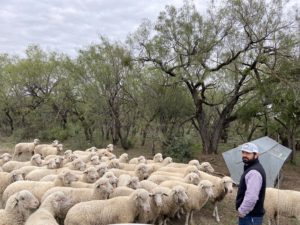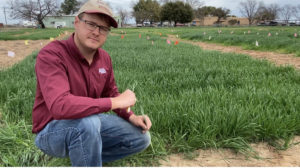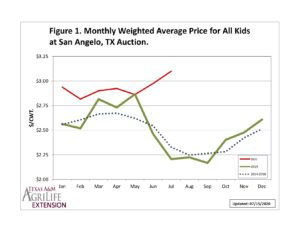Jordan Moody is the guest author for this month’s column. She is a PhD candidate working at the Texas A&M AgriLife center under an Extension graduate assistantship.
If you read “Reid’s Ram-blings” last month, you probably gained an appreciation for the deep-seated sheep culture that saturates West-Central Texas, and I did too. As a new San Angelo resident, I can say without a doubt that this is great sheep country. Something that is often overlooked though, is the abundance of multigenerational sheep expertise that the farmers and ranchers of Texas have to offer.
I don’t mean to ignore the goat producers; however, I am new to goat production and so for the purposes of this article, I will be sticking to what I know, and speaking through the lens of the sheep industry. Regardless, I am looking forward to learning more about the goat industry in Texas during my time here.
I was lucky enough to grow up in the sheep industry, being the 7th generation of sheep ranchers in my family. We had a flock of Targhee ewes in South-Central Montana, which ignited my passion for the sheep industry at a young age. In the past several years, I have had the pleasure of living in Upstate New York, Christchurch, New Zealand, and Central Michigan, where I was exposed to countless sheep production systems and various types of sheep producers, from beginning small farmers to large, extensive range producers. I truly value all the opportunities I have been afforded in my studies, but I believe my best learning has come from candid, sit-down conversations with producers around a supper table. I have learned invaluable lessons, both about life and about ranching, made life-long friendships, and found mentors that have guided me through my endeavors. These friendships and lessons are perhaps the most important thing to come out of my formal education thus far.
While I am only just beginning my sheep industry career, it is clear from listening to older generations that the industry has a way of awarding those who commit to being life-long learners. Some of my most important learning experiences have simply come from saying “yes” to an opportunity to travel somewhere new and change my perspective and see how other folks do it. I would like to encourage you to consider spending a little bit of time outside of your ranching operation and make it a point to do a little educational field trip, if even just around the state of Texas. I truly believe that whether you are just starting out, or are several generations deep, there is always something to be learned, and there is no wrong time to learn something new.
I moved to Texas in August of 2020, and since then I have had the pleasure of traveling around Texas with Reid and Jake. I am grateful for the producers who have welcomed me to their ranches and into their homes and taken time to teach me about their operations and give me various tidbits of advice and knowledge. I have learned so much about the importance of getting involved in the industry, about taking risks (and when not to), and about the importance of continuing to improve without forgetting that multigenerational knowledge that is the foundation of our industry. I also have gained a deep appreciation for the neighborly attitude embraced by so many of the Texas producers I have had the privilege to meet so far.
Each place I have lived, I have learned something new. Not everything that works for Michigan sheep producers will work on the high desert in Montana, and not everything that has proven successful in New Zealand will be practical on the West Texas range. Even so, I believe that we all have something to learn from each other. The sheep industry is one that is rich in knowledge and tradition, and I think that is something to be celebrated.
I was, and certainly am still very naïve to the diversity we have in the sheep industry, but traveling to farms and ranches, attending industry conferences such as ASI or The Lamb Summit, or getting involved with producer groups and state associations has broadened my horizons immeasurably. It is my hope that we, as Texans (either newly minted or life-long) can take full advantage of the networking aspect these national events and organizations have to offer, and truly take time to learn from each other, as there is always value in a change of perspective.
I encourage everyone to embrace and even admire each other’s differences, but never pass up an opportunity for a cup of coffee and conversation with another producer, because you never know what you might learn from each other.
To provide feedback on this article or request topics for future articles, contact me at reid.redden@ag.tamu.edu or 325-657-7324. For general questions about sheep and goats, contact your local Texas A&M AgriLife Extension Service county office. If they can’t answer your question, they have access to someone who can.










